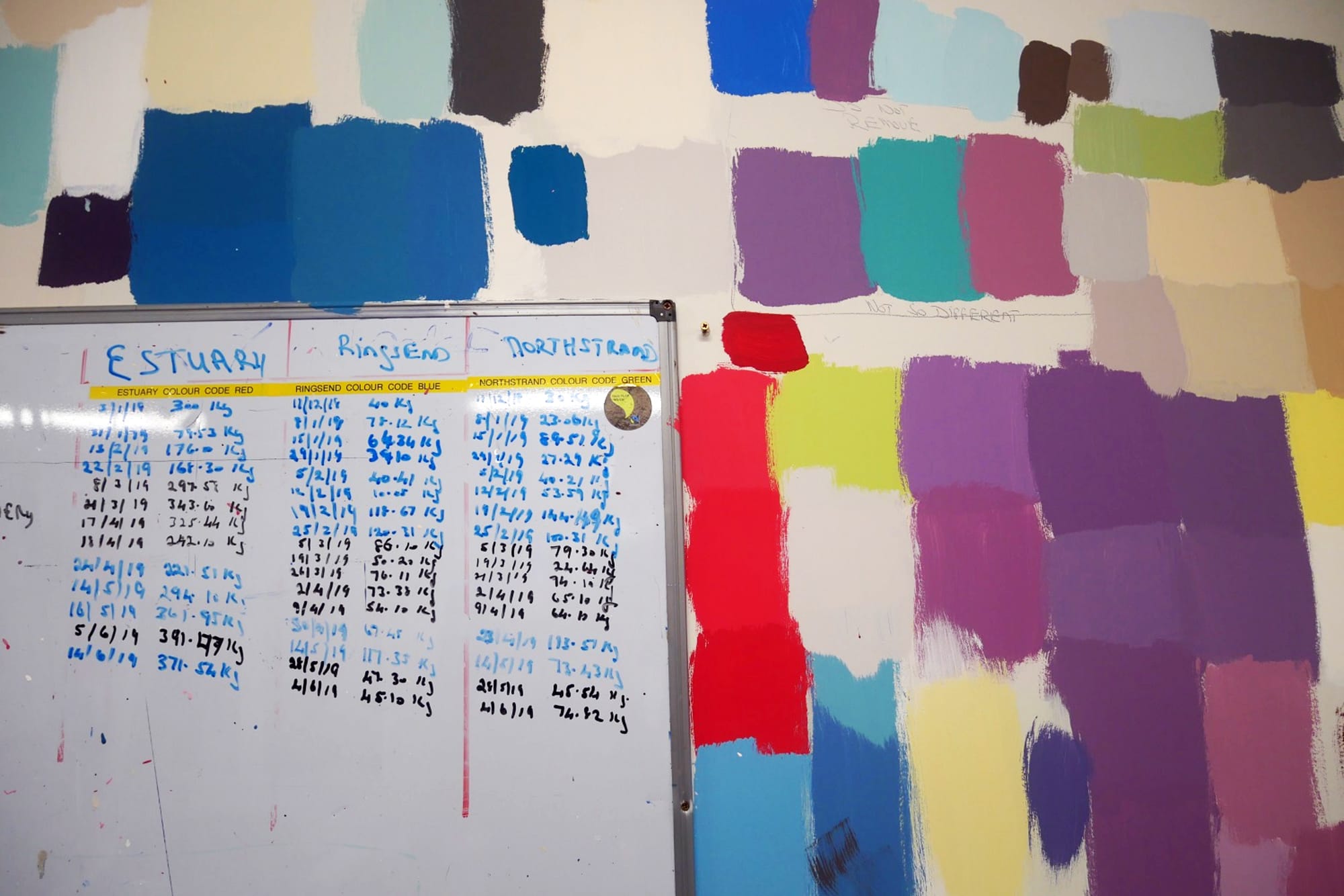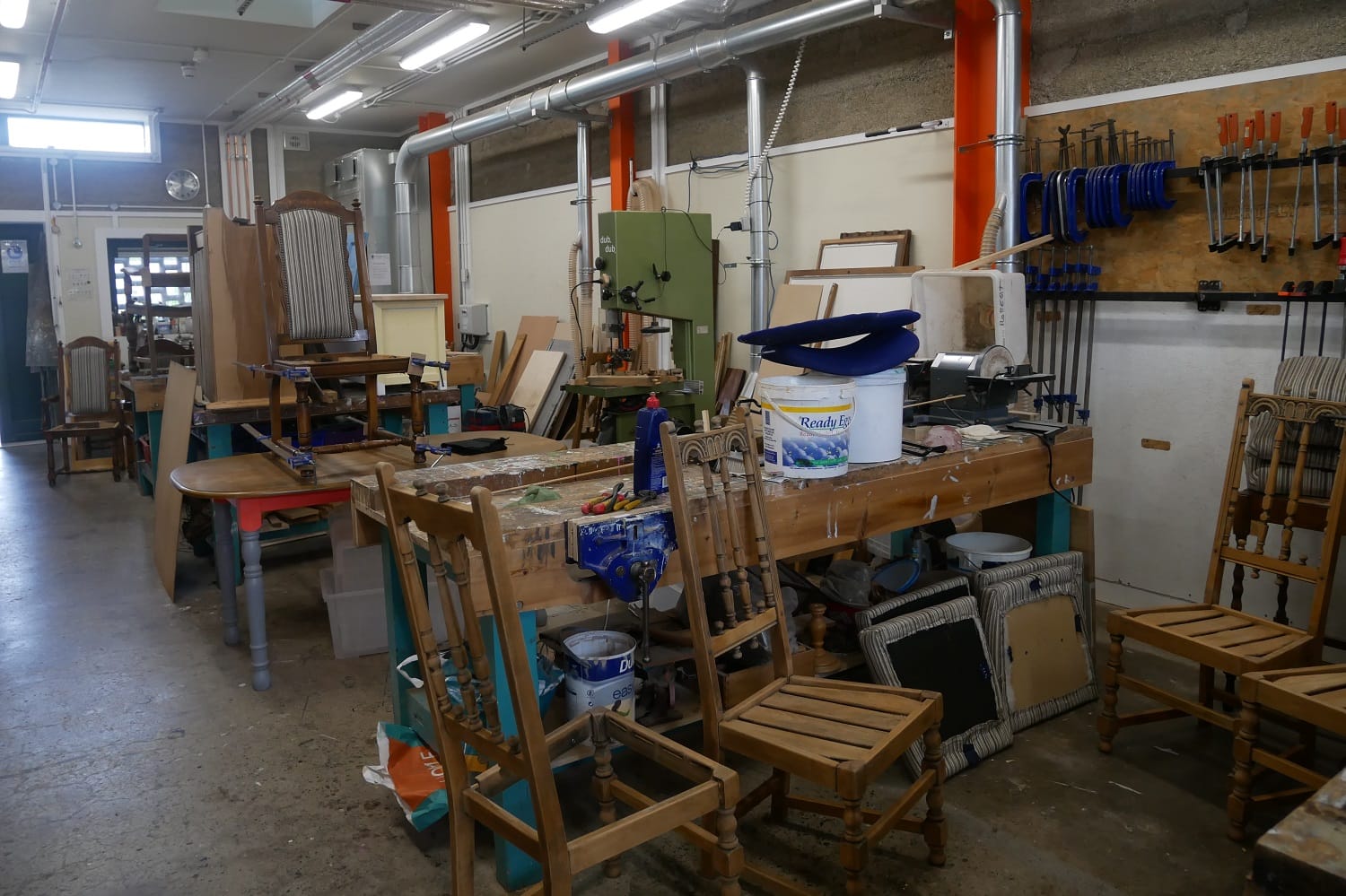What’s the best way to tell area residents about plans for a new asylum shelter nearby?
The government should tell communities directly about plans for new asylum shelters, some activists and politicians say.
The Rediscovery Centre in Ballymun houses four social enterprises with reuse and repair at their hearts. The team wants to help others pursue the same goals.

Ger Griffin points to the giant paddle for stirring, and the giant sieve for sifting out detritus that swims in some old paint pots.
“People throw all sorts of things in,” he says.
Rediscover Paint is a small set-up. It’s led by one technician known as “Rainbow Dave”, who’s about to take on a helper, says Griffin.
It’s also one of the ventures run out of the Rediscovery Centre in Ballymun that Griffin thinks is the most scalable right now.
“It’s one that can be reproduced in every county in Ireland, in every city in Ireland,” he says. “There’s a huge volume of paint out there, to be worked upon.”
Last month, the Rediscovery Centre launched a new Circular Economy Academy, a free mentoring programme to share what those at the centre have learnt with others who want to start, or grow, enterprises with a similar ethos.
“Lots of people that we spoke to, kind of communicated the need for something like this,” says Sarah Miller, the centre’s chief executive.
Right now, there are four social enterprises run from workshops at the Rediscovery Centre, a refurbished boiler house tucked away off Ballymun Road.
One social enterprise focuses on fashion and reuse, another on bike repair, one on paint and another on furniture. Griffin’s focus is the last couple of these.
Dubliners leave old paint at some recycling centres. Folks from the Rediscovery Centre collect some of it – the water-based pots, not the hazardous solvent-based paints – and bring it back, says Griffin.
All paint gets classified as hazardous and – if not collected – shipped to Germany for incineration, says Griffin. “Whereas in fact, a lot of it is renewable.”

They clean it and blend it, he says. That last step is done by “Rainbow Dave”, Dave Kavanagh, the technician, who can mix a colour by sight.
Some of the wall is a patchwork of colourful daubs of paint. There’s a chart, showing how much paint they’ve collected.
Once cleaned, they sell the paint again. It’s at a significant discount: €1 a litre, rather than €5 to €10 a litre.
“It’s a win-win situation,” says Griffin. “Our ethos is to reduce, reuse, and recycle then at the end of it.”
Miller, the Rediscovery Centre’s CEO, says they get a few different kinds of requests for advice, usually.
Some want to substitute reused or sustainable materials into products that they’re already making, she says. “We had that expertise of working with emerging businesses and designers to make their practices more sustainable.”
Others are looking to develop products where services could be borrowed, shared, or leased, she says.
The circular economy is a system that tries to cut waste at all stages and keep resources in circulation for longer.
The Rediscovery Centre is hoping to roll out nationwide some of the classes they do in schools, and add research programmes and more community engagement.
They’ve started a circular-economy conversation series, too. “That is focussed in on particular topics, where there are opportunities for the circular economy to blossom,” Miller says.
They want to set up hubs in different regions too, says Miller, the centre’s chief executive.
Further along the corridor on the ground floor of the Rediscovery Centre is the furniture workshop.
There are big chairs, small chairs, some dark wood and solid, others carved and skinny.
“These are great quality,” says Griffin, pointing to some with tall ornate backs.
People are too ready to get rid of chairs, he says. “They’re forever breaking. But they’re repairable.” Joints can just be re-glued, he says. “It’s as simple as that.”
This business works a bit differently to the paint. Most of what they do here is repairs and restoration, he says – doing up items.
That’s thrown up some interesting pieces. Like the time a woman called up to get a plywood chair repainted, he says.
The photo she sent was striking. “The shape,” he said. “The acuteness of the curves on it.”
It turned out to be a 1960s piece from a Dutch designer, one of just 200 – and possibly worth $3,000, he says.
He conserved the plywood, cleaned off grime, wax polished it and gave it back. “And they were going to get it painted,” he says.

They also take some donations of furniture, though, do it up, and sell it in the eco-store on the top floor.
It works something like this, Griffin says: people call and say they’ve something to donate; he tells them to send a photo and if it’s something they can repair and resell, they collect it.
It’s harder to make money off any business around repairs, he says. That’s something he knows, having worked in furniture restoration for 30 years.
It’s so labour-intensive and hard to speed up, he says. “Especially, if you’re doing it properly.”
Part of what they do in the workshop is training though, he says. “Pass on the skills, so it’s not just me on my own, beavering away.”
Miller says all the enterprises at the Rediscovery Centre have a strong focus on social impacts.
“If you focus solely on profitability, then you start to lose the social impact whereby progression rates for people moving from longer-term unemployment into full-time employment or into full-time education, they begin to drop,” she says.
“It has to cover enough to keep the products running – we’re a business like anything else,” she says. But it’s about more than that.
Griffin says, as part of the academy, he expects to be talking to other enterprises about what they’ve learnt, how to set up a workshop, and what skills people need.
“You really can make a difference to people’s lives as well as the environment of course,” he says. “I would love to be out telling more people about what we do.”
Get our latest headlines in one of them, and recommendations for things to do in Dublin in the other.